Table of Contents
- Introduction
- Platforms Enabling Creator Monetization
- Social Tokens and Creator Benefits
- Legal and Tax Considerations
- Decentralized Identity and Affiliate Marketing
- Future Trends and Market Outlook
- Conclusion
- Resources
Introduction
In the digital era, a new paradigm is transforming how creators monetize, engage with their audience, and build sustainable, independent careers. Tokenized content creator platforms sit at the core of this revolution, utilizing blockchain technology to empower artists, writers, musicians, and influencers to earn and interact directly—free from the constraints and fees of traditional intermediaries. As Web3 technologies advance, the possibilities for creator economies expand, opening the door to decentralized, transparent, and community-driven models that redefine digital engagement and value exchange.
What Are Tokenized Content Creator Platforms?
Tokenized creator platforms harness distributed ledger technologies to enable creators to issue digital assets—often called social tokens or creator coins—that represent value, utility, or governance rights within a creator-centric ecosystem. Unlike traditional platforms, where revenue flows through centralized intermediaries, these environments run on smart contracts that automate and irrefutably record every transaction. Such systems establish a visible and secure framework for exchanging value, rewarding contributions, and enabling borderless, 24/7 participation for global audiences. Tokenization paves the way for enhanced digital ownership by granting both creators and fans actual stakes in creator success, content access, and decision-making processes.
Why Direct Monetization Matters
Historically, creators have faced numerous barriers to financial independence: high platform fees, opaque algorithms, lack of audience data, and delayed or unpredictable payments. Tokenization directly addresses these limitations by removing middlemen and enabling instantaneous, peer-to-peer monetization. With a programmable token economy, creators gain the flexibility to design custom earning models—ranging from subscriptions to auctions, royalties, and beyond—while fans can invest in creators through token holding, thereby becoming active stakeholders in their journeys and outcomes.
Over 30% of active creators used tokenized platforms for monetization in 2024, with a platform market projection exceeding $2 billion.
Overview of Benefits for Creators and Fans
The adoption of tokenized content platforms yields profound benefits for both creators and their audiences. Revenue transparency is embedded, thanks to immutable blockchain records that provide open, auditable payment histories for every transaction. Fans experience unprecedented engagement through mechanisms like fan-based voting, direct DMs to creators, or participation in exclusive communities. Equally significant is community governance: audience members with tokens can propose and vote on new features, platform policies, or content directions, solidifying their sense of belonging and impact. This holistic ecosystem encourages ongoing participation, loyalty, and shared prosperity for all stakeholders involved.
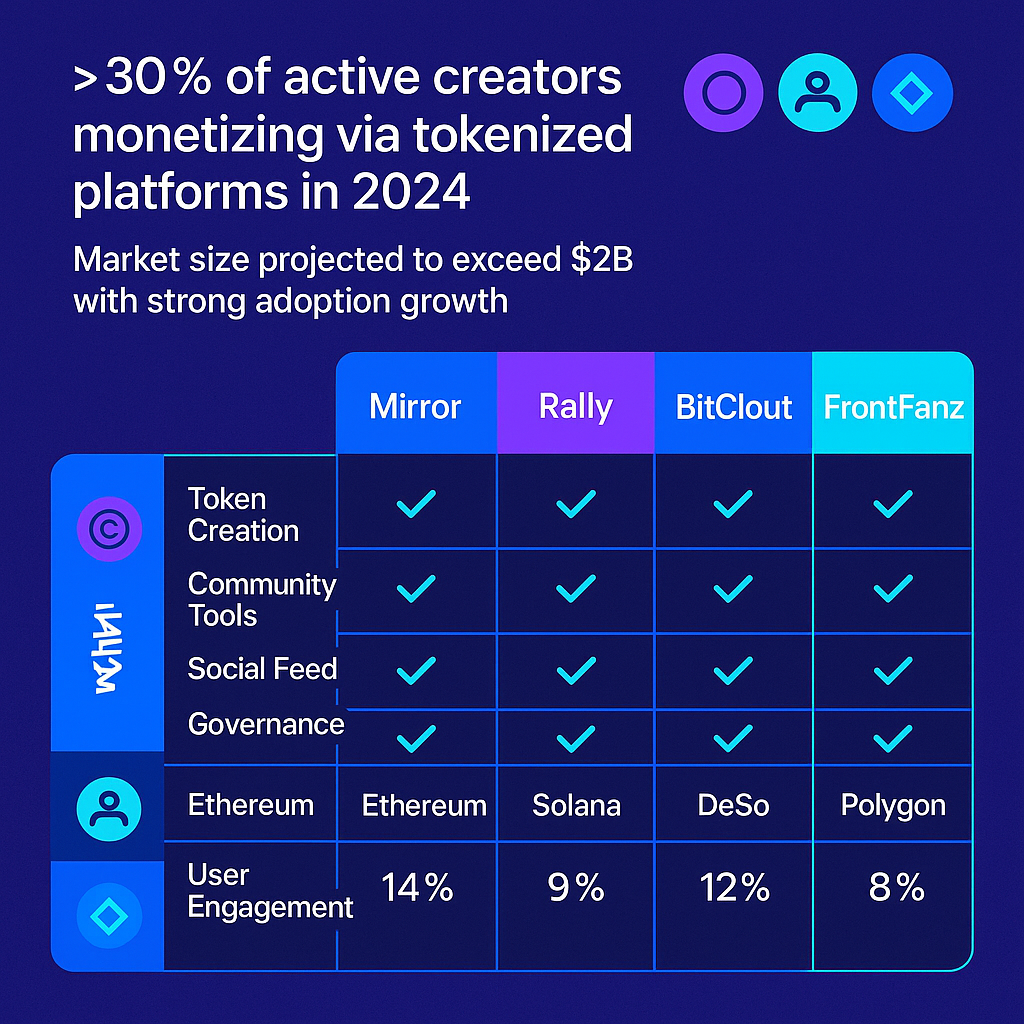
Platforms Enabling Creator Monetization
In recent years, the proliferation of tokenized creator platforms has democratized digital earning and empowered creators to harness new digital asset marketplaces. These platforms deliver robust infrastructure, enabling creators to launch tokens, engage communities, and monetize work without sacrificing autonomy to gatekeepers. The diversity and innovation in this space continue to redefine digital content economies.
Leading Web3 Platforms
Modern Web3 platforms are pioneering new models for direct, decentralized revenue generation. Platforms like Mirror transform storytelling and writing by enabling the minting and sale of text-based NFTs, powering publication models centered on reader communities. Similarly, Rally and BitClout (now DeSo) introduce social tokens to facilitate two-way value creation between creators and fans, where ownership of a creator’s token bestows voting privileges, access to premium content, and even a share in future earnings. FrontFanz distinguishes itself with robust censorship resistance and a transparent blockchain domain registry, offering creators up to 85% revenue retention while leveraging verifiable ownership and audience analytics. Platforms like Catalog focus on music and audio NFTs, letting musicians directly monetize tracks and fan interactions in a trustless, permanent environment. Collectively, these tools put unprecedented control and earning power in creators’ hands, transforming them from content suppliers to ecosystem architects.
Features Supporting Fan Investment
Fan engagement is central to the new creator economy. Tokenized platforms craft innovative investment and participation mechanisms that transform passive audiences into active community partners. Fractional ownership allows multiple fans to co-own exclusive content or unique creator assets via token shares, opening previously inaccessible opportunities to a broader audience. Many platforms build in voting rights through governance tokens, allowing fans and stakeholders to shape the future direction of a creator’s brand, content strategy, or even platform-level decisions. Exclusive access is granted to token holders, providing perks like behind-the-scenes content, private forums, discounts on NFTs reshaping creator economy, and first bids on limited edition releases. These dynamics foster deeper connection and financial alignment between creators and supporters, fueling ongoing community building and loyalty.
Token Launch Services
Launching a successful token requires more than technological infrastructure—it demands user-friendly design, audience education, and compelling engagement strategies. Platform-hosted services simplify this complex process by helping creators design custom tokens, draft creator token launches with unique utilities (such as gated access, rewards, or voting functionality), and market them to maximize reach. Advanced platforms support automated smart contracts, enabling direct, transparent revenue splits and royalty distributions, as well as zero-fee transfers for enhanced community incentives. Various launchpads offer analytics tools, airdrop functions, and community support forums, providing end-to-end solutions that help creators turn fans into stakeholders and innovative backers.
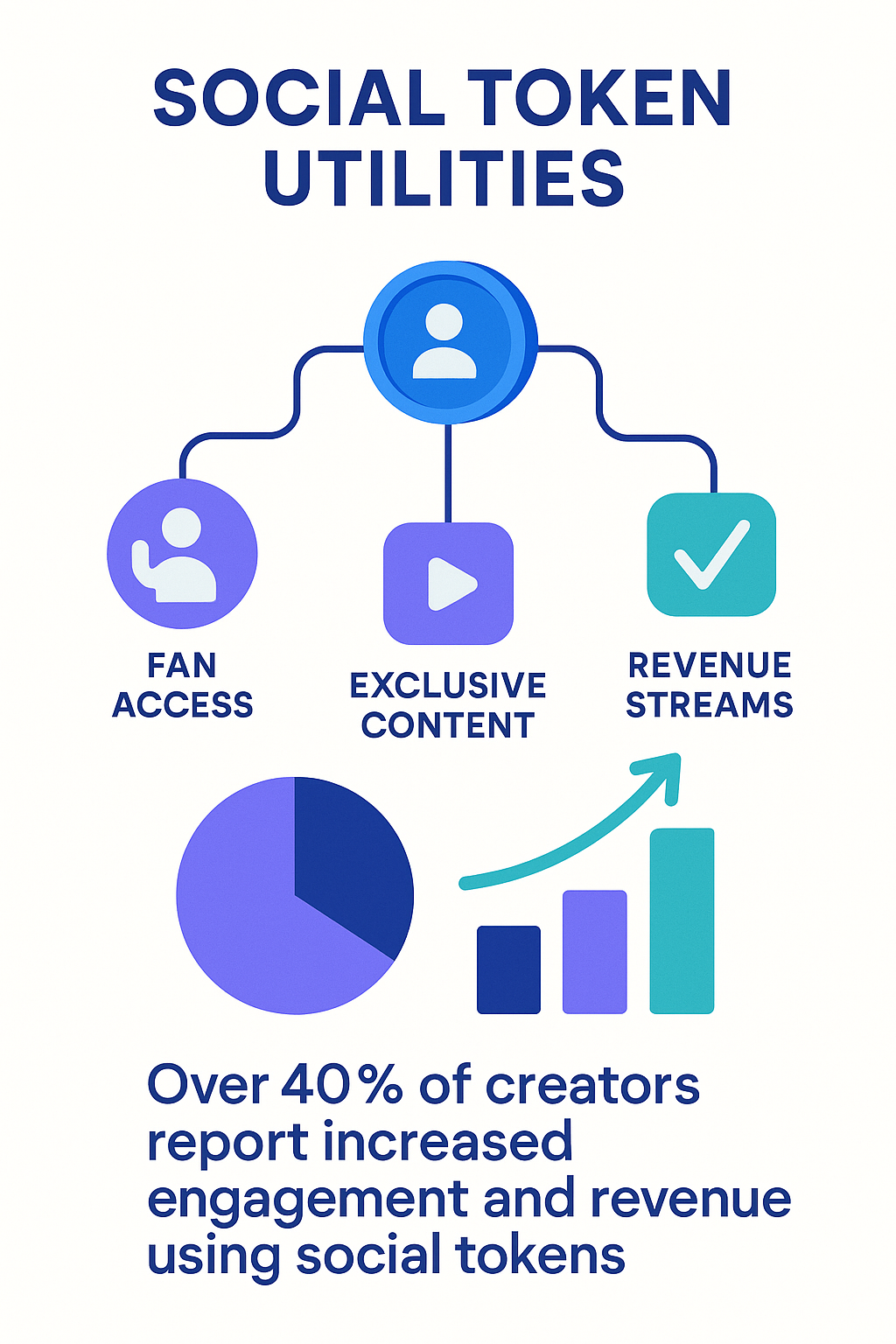
Social Tokens and Creator Benefits
At the heart of the creator economy’s transformation are social tokens—programmable digital assets that bring new dimensions to community engagement, monetization, and ownership. By seamlessly integrating utility with community dynamics, these tokens unlock innovative value flows for both creators and fans.
Token Utility and Community Engagement
Social tokens function as digital keys, granting holders perks like early access to content, private chats, voting on creative decisions, and participation in membership clubs. They incentivize engagement by letting fans accrue status and rewards through activity, referrals, or content creation, directly strengthening the creator’s brand. For creators, token-driven communities lower churn rates and empower decentralized content moderation through community voting. Data from recent industry analyses reveals that over 40% of creators report increased fan engagement and revenue after introducing social tokens to their platforms.
The token economy is redefining digital ownership, transparency, and value flows between creators and their fans.
Monetization Models with Social Tokens
The flexibility of social token infrastructure grants creators myriad monetization avenues. Direct sales of tokens can finance new projects, while holding tokens may unlock exclusive digital goods, limited edition merch, or real-world events. A significant number of platforms offer royalty models—with creators earning a percentage of every token resale—and automated revenue sharing schemes that distribute income proportionally to stakeholders. Some creators leverage social tokens as loyalty points, redeemable for discounts on digital asset marketplaces or for prioritized access to collaborative campaigns. This versatility allows each creator to shape monetization to best align with their brand, audience expectations, and community ethos.
Case Studies of Successful Token Launches
Numerous creators and startups have already harnessed the power of social tokens to scale their impact and income. The platform Rally has seen artists mint personal tokens, raising significant upfront capital and cultivating fan clubs with high retention rates. FrontFanz creators, by utilizing dedicated blockchain domain name systems, retain strong brand control and build token-gated experiences that monetize across content types. Mirror demonstrates how writers can launch crowd-funding campaigns and distribute profits based on stakeholder token-holdings. In the music arena, Catalog’s NFT drops have enabled independent musicians to earn direct royalties while empowering fans to influence future collaborations. These examples underscore the business viability and creative dynamism that tokenization brings to the modern creator landscape.
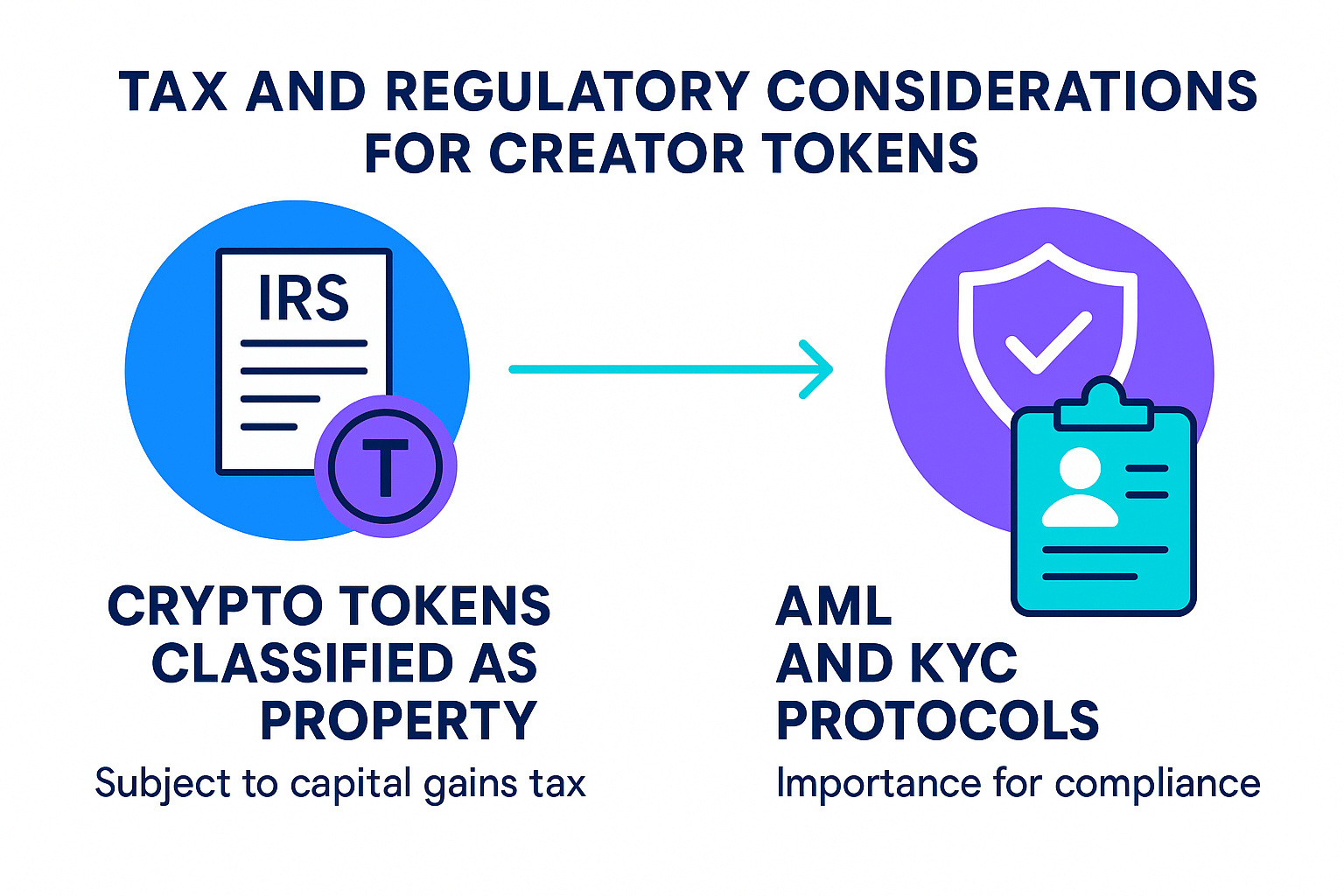
Legal and Tax Considerations
As the popularity of tokenized platforms surges, it is essential for creators and users to understand the evolving legal and tax environment surrounding digital assets. Regulatory clarity, tax compliance, and engaging with security best practices are critical elements that underpin sustainable growth and user confidence within the creator ecosystem.
Tax Implications for Creator Tokens
Tax authorities worldwide are catching up with the proliferation of digital assets. In jurisdictions like the U.S., the IRS classifies crypto tokens as property, triggering tax implications such as capital gains taxes on sales or income reporting on token payouts. Creators must diligently record the value of tokens received at the time of acquisition and report earnings, even when tokens are illiquid or held long-term. Cross-border transactions can further complicate reporting, as different countries interpret tokenized value differently. Consulting with tax professionals familiar with digital assets is advised to ensure full compliance and to avoid potential legal exposure.
Creators must maintain transparent transaction records for accurate annual reporting to tax authorities.
Regulatory Compliance and Security
The increasing intersection between digital assets and mainstream finance brings heightened attention from regulators. Tokenized platforms must address robust regulatory compliance requirements, such as anti-money laundering (AML) and know-your-customer (KYC) protocols, to deter financial crime. Some regions treat certain tokens as securities, demanding disclosures and registration, while others emphasize the need for consumer protections. From a security standpoint, frequent smart contract audits, code transparency, and continuously updated blockchain security protocols are non-negotiable. Proactive investment in compliance infrastructure not only mitigates operational risks but also strengthens user trust in the long-term viability of tokenized platforms.
Mitigating Legal Risks
Despite rapid innovation, creators and platform operators contend with multiple legal risks including unclear intellectual property rights, vulnerabilities in automated contract execution, and the potential for regulatory shifts that can affect revenue streams. To mitigate these risks, platforms widely recommend: (1) robust terms of service co-developed with legal counsel; (2) clear definitions of token utility for purchasers; and (3) transparency about possible changes to token governance or redemption rights. Smart contracts should be regularly updated following peer reviews and third-party audits, ensuring remedies are available should bugs, exploits, or legal challenges arise.
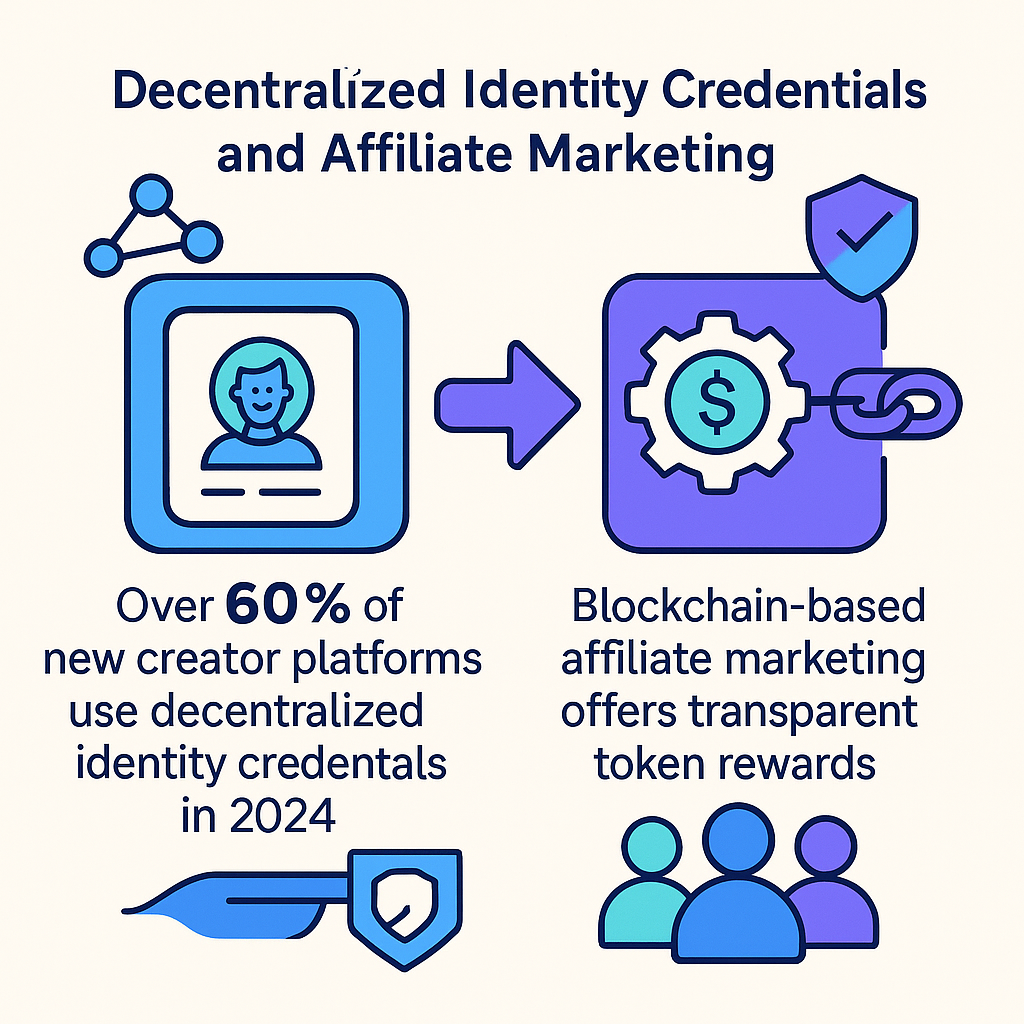
Decentralized Identity and Affiliate Marketing
Identity and reputation are crucial for creators in the Web3 universe. Modern platforms are integrating decentralized identity credentials and blockchain-based affiliate models to improve privacy, boost trust, and cultivate authentic communities that reward positive participation.
Decentralized Identity Credentials for Creators
Decentralized identity (DID) systems replace traditional usernames and passwords with cryptographically verifiable credentials, allowing creators to manage their digital reputations independently of platform owners. DIDs enable secure single sign-on experiences, facilitate reputation scoring through on-chain records, and can be linked with brand domains using blockchain domain registry for seamless Web3 authentication. In 2024, over 60% of new creator platforms employ DID systems to enhance privacy without sacrificing accountability, offering a robust foundation for decentralized identity privacy and secure audience relationships.
Integrating Decentralized Affiliate Marketing
As creators seek new ways to expand audiences and diversify income, Web3 platforms introduce innovative models for decentralized affiliate marketing. These systems run on transparent, immutable smart contracts, rewarding participants through automated token payouts and eliminating the delays and disputes common in legacy affiliate programs. Hashtag.it.com, for instance, shows how platforms now offer crypto affiliate program and crypto affiliate services that seamlessly track referrals, split revenue, and incentivize content creators—without intermediaries—maximizing earning potential across the creator economy.
Enhancing Platform Security and Trust
Robust onboarding practices such as multi-factor authentication, regular blockchain security audits, and transparent dispute resolution protocols are critical to platform longevity and community protection. Open-source codebases, strong encryption, and real-time monitoring further increase confidence among both creators and fans. By integrating decentralized identity systems with robust affiliate marketing and security best practices, today’s platforms cultivate a culture of transparency, resilience, and mutual trust—fundamental components for sustainable, long-term community building.
Future Trends and Market Outlook
The tokenized creator economy continues to accelerate, spurred by technological innovations and shifting community expectations. The years ahead promise deeper adoption, improved interoperability, and the emergence of advanced governance systems that will shape the digital creator landscape.
Market Growth and User Adoption
Industry reports project that creator token platforms will witness compound annual growth exceeding 50% over the next two years, with user bases expanding into millions globally. The total addressable market for the creator economy is set to surpass $2 billion by 2026, driven by heightened demand for creator earnings transparency, fan participation, and creator-controlled platform experiences. According to 2024 engagement data, active users on leading platforms demonstrate retention rates up to 35% higher than traditional SaaS creator tools, reflecting strong faith in the tokenized ownership model.
Cross-Chain and Interoperability Advances
One of the next frontiers of innovation is interoperability. Platforms are integrating cross-chain technology to allow tokens, NFTs, and reputation signals to flow freely between ecosystems and chains, powering greater liquidity and accessibility. This leap not only opens up markets to more users but also ensures the portability of creator assets, reputation, and digital ownership across platforms like Hashtag.it.com and beyond.
Evolving Community Governance and DAOs
As user bases grow and communities become ever more invested, governance is shifting to decentralized models managed by on-chain organizations, or DAO governance. Platforms increasingly utilize token-weighted voting, allowing the most committed community members to decide on policy changes, feature rollouts, and platform partnerships. These DAOs empower users by distributing power equitably and making continuous innovation possible—a dynamic likely to shape the next generation of creator-first tools and experiences.
Conclusion
Tokenized content creator platforms represent a seismic shift in how value, creativity, and connections are exchanged in the digital economy. By enabling direct monetization, democratizing fan engagement, and embedding transparent governance, these platforms are forging resilient ecosystems built on collaboration and trust. For creators, fans, and stakeholders, understanding key platform features, the nuances of regulatory compliance, and technological advances like cross-chain integration is vital for sustainable participation and success.
Embracing tokenized economies is not just a technological innovation—it is a movement toward empowerment, autonomy, and lasting community building.
Ready to take your digital presence to the next level? Explore web 3.0 projects and tokenized creator platforms today to unlock direct monetization and deepen fan engagement in the Web3 era.
Resources
- 5 Platforms Rewarding Content Writers With Tokens
- Create and Launch Social Token
- MyAX Documentation
- FrontFanz Whitepaper
- Embracing Digital Ownership: Tokenization of Media and Entertainment Rights
- Tax Implications of Digital Assets
- Cryptocurrency Regulatory Compliance
- Legal Risks in Blockchain-Based Platforms
- Blockchain Security Practices
- Community Building in Web3 Platforms
- Decentralized Identity Privacy
- Decentralized Marketing Platforms
- How NFTs Are Reshaping Creator Economy
- Digital Asset Marketplaces for Creators
- Cross-Chain Technology in Web3
- DAO Governance in Web3
- Creator Platform Marketing
- Creator Earnings Benchmark Report
- Decentralized Identity and Privacy
- Blockchain Domain Registry
- Crypto Affiliate Program
- Blockchain Domain Name System
- Crypto Affiliate Services
- Web 3.0 Projects
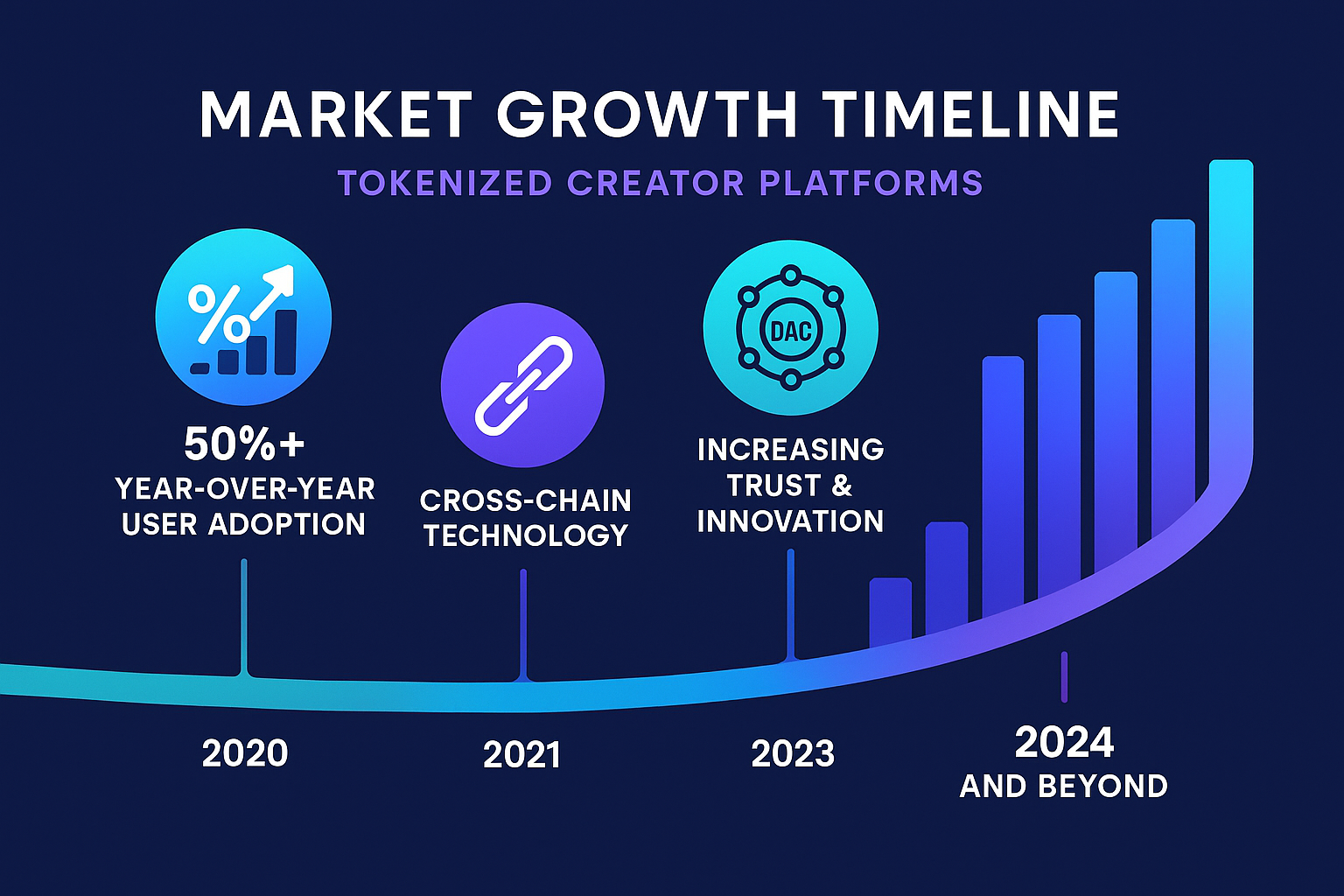
Leave a Reply